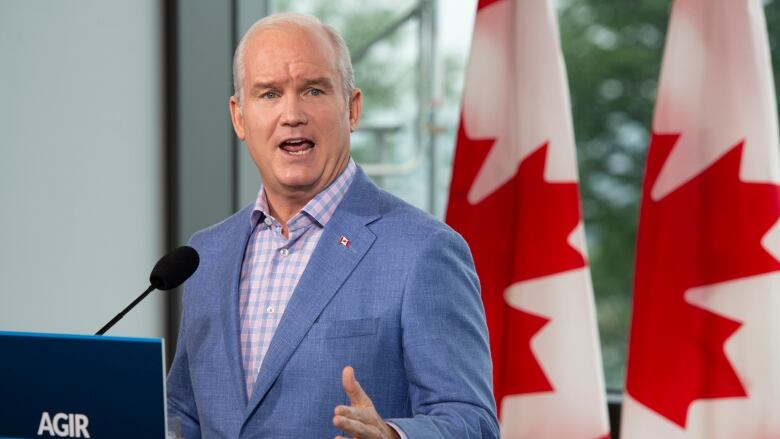Treat drug addiction as health, not criminal issue, O'Toole says in plan to tackle opioid crisis
Conservatives promise millions to build recovery centres and treatment beds

Conservative Leader Erin O'Toole offered on Sunday a "compassionate" plan to tackle the opioid crisis, treating it as a national emergency to help those battling drug addiction.
During a campaign stop at an addictions rehabilitation centre in New Westminster, B.C., O'Toole said 17 Canadians' deaths each day are related to opioids and that the health crisis has deepened during the pandemic.
- What do you want the main party leaders to talk about inthe English debate?Fill out this form.
- Have an election question for CBC News? Email ask@cbc.ca. Your input helps inform our coverage
"As prime minister, I will treat the opioid epidemic as the health crisis that it is," he said.
"That means that our focus should be on helping people with addictions get the help they need to recover."
The promises, part ofthe party's election platform book, include $325 million over three years to create 1,000 new treatment beds and build 50 recovery centres in communities across the country.
-
Find out who's ahead in the latest polls with our Poll Tracker.
-
Use Vote Compass to compare the party platforms with your views.
The plan also commits to enhancing culturally appropriate treatment and prevention services in high-needs First Nations communities, and to provide $1 billion over five years in additional funding for Indigenous mental health and drug treatment programs.
Asked by reporters whether he supports the decriminalization of drugs, O'Toole said he advocates judicial discretion for treatment options rather than criminal sanctions.
Help, don't punish: O'Toole
"I don't think someone with an addiction should be punished. I think they should be helped," he said.
Law enforcement should focus on dealers and traffickers, not on those suffering from an addiction, O'Toole added.
The Conservative leader said his party would not block safe injectionsites and would work on treatment and recovery programs alongside harm reduction options.
Watch / Conservative Leader Erin O'Toole on plan to tackle opioid crisis:
But Liberal Party spokesperson Alex Wellstead said the Conservatives' record has beenone of banning safe consumption sites and fighting them in court.
"The Conservatives' record is one of punishing Canadians battling addiction," he said in a statement.
"We will continue to support people facing addiction and provide safe and supervised alternatives. We believe in an approach informed by public health experts not ideology."
O'Toole's predecessor, Andrew Scheer, had criticized the Liberal government's approach to the opioid crisis, calling it "terrible."
About 40 new safe injection sites, where people can inject intravenous drugs with clean needles, have openedacross the country since the Liberals formed the government in 2015.
'Absolutely tragic epidemic': Julian
NDP candidate Peter Julian, a long-time MP for the New WestminsterBurnaby riding, said politicians must guarantee safe supply to people with addictions and must also look into the role of large pharmaceutical companies in the crisis.
"This is an absolutely tragic epidemic 17 Canadians every day. And I don't think either Mr. Trudeau or Mr. O'Toole understand the magnitude of this tragedy and are willing to take on big pharma in order to combat it," he said.
Some advocacy groups have called on thefederal government to create an action plan that includes the decriminalization and the legal regulation of drugs, as well as new initiatives to end stigma around addiction.













_(720p).jpg)


 OFFICIAL HD MUSIC VIDEO.jpg)
.jpg)



























































































